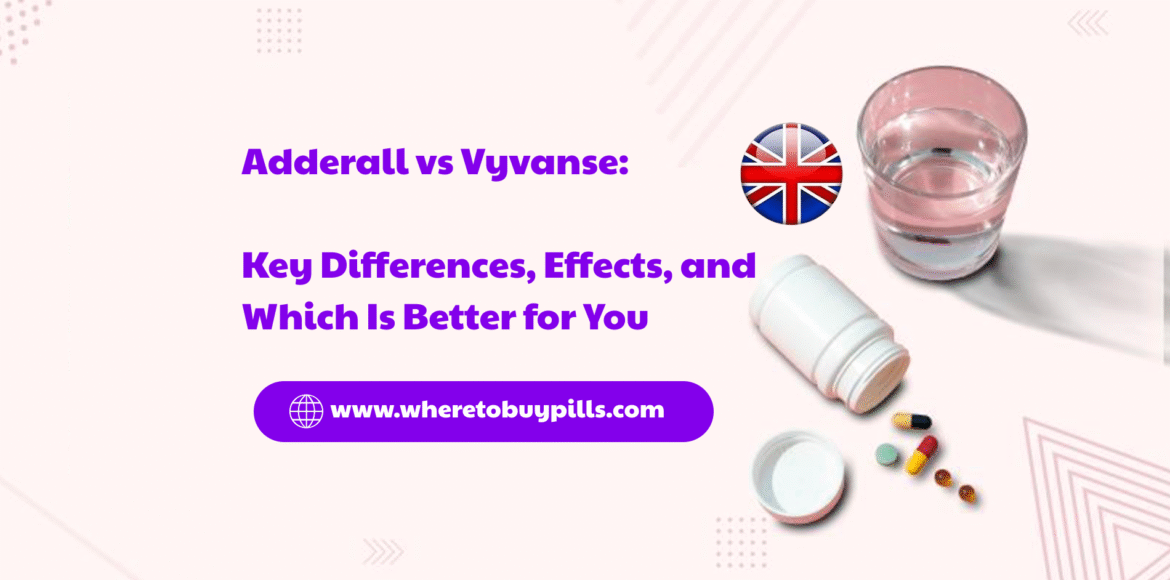Adderall vs Vyvanse – Key Differences, Effects & Safety Buy Adderall Online
Both Adderall and Vyvanse are popular prescription medications used to treat Attention Deficit Hyperactivity Disorder (ADHD) and, in some cases, binge eating disorder (Vyvanse only). They belong to the amphetamine class of stimulants, which help increase attention, focus, and impulse control.
Although they share similarities, there are important differences in how they work, how long they last, their potential side effects, and how they affect different individuals. Understanding these distinctions can help patients and caregivers make informed treatment decisions. Adderall vs Vyvanse.
What Is Adderall?
Adderall is a combination of amphetamine and dextroamphetamine, two central nervous system stimulants. It increases the levels of dopamine and norepinephrine in the brain, improving focus and reducing hyperactive behavior.
-
Available forms: Immediate-release (Adderall IR) and extended-release (Adderall XR)
-
Onset: 30–60 minutes
-
Duration: 4–6 hours for IR, up to 12 hours for XR
-
Approved uses: ADHD and narcolepsy
Because it acts quickly, Adderall can be easier to adjust based on daily needs — but it may cause peaks and crashes as the medication wears off.
What Is Vyvanse?
Vyvanse (generic name lisdexamfetamine dimesylate) is also a stimulant medication. It’s a prodrug, meaning it remains inactive until the body metabolizes it into dextroamphetamine.
-
Available forms: Capsules and chewable tablets
-
Onset: 1–2 hours (slower than Adderall)
-
Duration: Up to 14 hours
-
Approved uses: ADHD and binge eating disorder (BED)
Because Vyvanse is activated through metabolism, it provides a smoother, longer-lasting effect with a lower potential for misuse than Adderall. Adderall vs Vyvanse.
Adderall vs Vyvanse: Side-by-Side Comparison
| Feature | Adderall | Vyvanse |
|---|---|---|
| Generic Name | Amphetamine & Dextroamphetamine | Lisdexamfetamine |
| Type | Mixed amphetamine salts | Prodrug of dextroamphetamine |
| Form | Tablet or capsule | Capsule or chewable |
| Onset Time | 30–60 minutes | 1–2 hours |
| Duration | 4–12 hours (depending on IR or XR) | Up to 14 hours |
| Abuse Potential | Higher (immediate effect) | Lower (requires metabolic activation) |
| Approved Uses | ADHD, narcolepsy | ADHD, binge eating disorder |
| Common Side Effects | Insomnia, anxiety, appetite loss, dry mouth | Fatigue, irritability, appetite loss, nausea |
Effectiveness: Is Vyvanse or Adderall Stronger?
Both drugs are highly effective for treating ADHD, but the experience varies from person to person.
-
Adderall provides a faster onset and may be preferred by people who need immediate symptom relief in the morning.
-
Vyvanse delivers a longer, steadier focus throughout the day without sudden crashes or rebound effects.
Clinical studies show both medications have comparable efficacy in improving ADHD symptoms, but Vyvanse often results in smoother symptom control and fewer “ups and downs.” Adderall vs Vyvanse.
Side Effects: Adderall vs Vyvanse
Because both medications are stimulants, their side effects are similar, though intensity may differ.
Common side effects include:
-
Decreased appetite
-
Dry mouth
-
Insomnia
-
Increased heart rate
-
Anxiety or nervousness
-
Irritability
Adderall-specific concerns:
-
Can cause energy spikes and crashes
-
May trigger more pronounced anxiety in sensitive users
Vyvanse-specific benefits:
-
Lower abuse potential
-
Fewer withdrawal symptoms due to gradual metabolism
Which Is Safer?
When taken as prescribed, both Adderall and Vyvanse are considered safe under medical supervision. However:
-
Adderall may be riskier for people prone to stimulant misuse or heart issues because of its immediate effects.
-
Vyvanse’s slow-release mechanism makes it less likely to be abused or cause dependence.
Always discuss your medical history, sleep patterns, and lifestyle with your doctor before choosing between the two.
Cost and Availability
Both medications are available by prescription only and are Schedule II controlled substances in the U.S.
-
Generic Adderall is widely available and less expensive.
-
Vyvanse is still under patent (until 2023–2024 in some markets), making it more costly, though some insurance plans cover it.
Who Should Take Adderall vs Vyvanse?
-
Adderall may be better if:
-
You need flexible dosing (IR and XR options).
-
You respond better to a fast-acting stimulant.
-
Cost is a concern (generics are cheaper).
-
-
Vyvanse may be better if:
-
You need smoother, longer symptom control.
-
You’re concerned about abuse potential.
-
You’ve experienced “crashes” on Adderall.
-
Your doctor may even try both at different times to determine which works best for your body chemistry.
Can You Switch Between Adderall and Vyvanse?
Yes — but only under medical supervision. Transitioning requires careful dose conversion since the drugs differ in potency and duration. Your doctor will guide the switch gradually to avoid side effects or withdrawal symptoms.
FAQ: Adderall vs Vyvanse
1. Is Vyvanse the same as Adderall?
No. Both are stimulants, but Vyvanse is a prodrug that becomes active only after digestion, providing smoother effects.
2. Which lasts longer — Adderall or Vyvanse?
Vyvanse lasts up to 14 hours, while Adderall XR typically lasts 10–12 hours.
3. Is Vyvanse safer than Adderall?
Vyvanse generally has a lower risk of misuse because it must be metabolized before becoming active.
4. Can Vyvanse cause fewer side effects?
Some people report less jitteriness or anxiety on Vyvanse due to its gradual release, but results vary.
5. Which is more expensive?
Generic Adderall is usually cheaper than Vyvanse, which is still brand-only in many areas.
Final Thoughts
When comparing Adderall vs Vyvanse, both are effective ADHD medications — the best choice depends on your body chemistry, lifestyle, and medical needs.
Adderall acts quickly and costs less, while Vyvanse provides a smoother, longer-lasting focus with reduced risk of abuse. Always work closely with your healthcare provider to find the most balanced and safe treatment for your ADHD symptoms.


